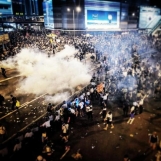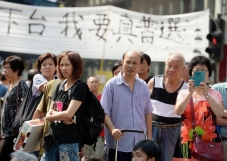
It was 25 years ago that Chinese troops moved en masse into Tiananmen Square, crushing student-led demonstrators who had been there for several weeks demanding political pluralism and an end to cronyism and corruption.
First reports said soldiers moving towards the centre of Beijing had used live ammunition against demonstrators and local residents massed at strategic points around the city.
An air of quiet frenzy seized the foreign desk of the paper I was then on in London as we endeavoured to make sense of what was happening. Until then the Chinese authorities had avoided a show of naked force, and it wasn't immediately clear that a bloodbath was in the offing.
The world had been lulled by the steady raft of reforms over the previous few months in what was then the Soviet Union under Mikhail Gorbachev into thinking that the miraculous was about to happen in China too. Many of those who died had clearly shared that optimism.
Even now, no-one knows just how many lost their lives by the time the troops had cleared the square. Estimates range from several hundred to several thousand.
Nor is it known how many died in the months that followed as the Chinese authorities, their objectives achieved, set about tearing the protest movement out by the roots in the universities where it had first flourished.
Today, it's said, those establishments are 'model' institutions, professors and students united in their support for the party and the government, which more or less amounts to the same thing.
Given the lesson of Tiananmen Square, one can only watch the protests engulfing Hong Kong with a sense of foreboding. Undoubtedly a sense of safety in numbers sustains the demonstrators. And, just as obviously, their demands, to anyone living in a democracy, are entirely reasonable.
They want to be free in 2017 to elect a leader without the choice of candidates restricted to those approved by a pro-Beijing committee.
But those who maintain that China is a very different country to that of quarter of a century ago need look no further than Tibet to see dissent still met with torture, imprisonment and even execution to be disabused of that notion.
China itself, warns Human Rights Watch, is a country where despite rapid socio-economic change and some relaxation of restrictions "the government remains an authoritarian one-party state. It places arbitrary curbs on expression, association, assembly, and religion; prohibits independent labour unions and human rights organisations; and maintains Party control over all judicial institutions."
Christians in the province of Zhejiang, close to Shanghai, can attest to what happens to organised opposition to the party line. In recent months churches have been demolished in several towns and others told to pull down buildings or make their crosses unobtrusive.
Such harassment, worse some say than that endured under the Cultural Revolution, makes clear Beijing's hostility towards forces over which it has no control. In China, churches that want to function in peace must belong either to the officially approved Protestant Three-Self Patriotic Movement, or the Chinese Catholic Patriotic Association.
Wang Zuoan, Director of State Administration for Religious Affairs (SARA), told the newspaper China Daily last month: "The construction of Chinese Christian theology should adapt to China's national condition and integrate with Chinese culture."
None of this will be news to the Baptist ministers, Catholic cardinals and Christian students that Christian Today reported this week to be in the vanguard of the Hong Kong protests. They, and others with them on the streets of the former British colony, know they are playing for high stakes.
The authorities could, it's true, find some face saving way of backing down, although you don't have to be an expert sinologist to recognise that such a move could trigger similar protests elsewhere in China. They may also hope that by doing nothing, the demonstrations will run out of steam.
A violent crackdown, however, remains a distinct possibility. And even if the brutality of 25 years ago is avoided, those publicly identified with the demonstration can expect the kind of hounding that pursued those held responsible for the Tiananmen Square demonstration for years.
That Hong Kong's Christians have emerged as vocal supporters of the protests is hardly a surprise. Christians of all denominations have a long history of standing against oppression and injustice, even with co-religionists among the forces they oppose.
For faith can move mountains. A year or two after Tiananmen, as a journalist based in South Africa, I witnessed first-hand the dismantling of apartheid. "What prompted you to act?" I asked then President FW de Klerk who was driving the reforms through.
"It wasn't a Damascene conversion," he replied. "But the branch of the Dutch Reformed Church to which I belong eventually realised that apartheid was a sin – and I came to see it as such."
The events of the next few days will determine whether or not the Chinese authorities can summon up such flexibility, or will again turn the clock back.
Andrew Hogg is Christian Aid's head of media.
















